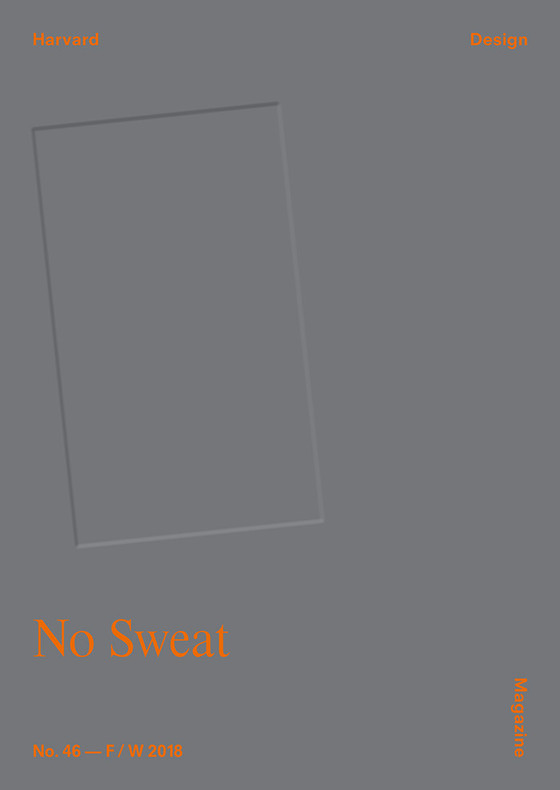Designing at Knee Level
46: No Sweat

This issue of Harvard Design Magazine is about the design of work and the work of design. “No Sweat” challenges designers to speculate on the spaces of work in an accelerated future, and to imagine a world in which a novel ethics of labor can emerge. What scenarios and spaces can we imagine for the next generation of work? How can we anticipate and formulate work environments and experiences that are productive, humane, and ecologically responsible?
From corner office to kitchen sink, from building site to factory floor, from cubicle to car to coffee shop, work shapes our lives and physical world. Whether we produce objects, generate ideas, manage processes, or perform services, work is a hybrid of dedication and alienation, power and oppression. As work spaces morph to integrate machines that mimic, assist, or complement human abilities, the way we perform work, and the way we feel about it, change too.
To work (to put forth effort) and the work (that effort, or the result it generates) are sources of pride and shame, fulfillment and drudgery. As many jobs become obsolete, and as populations are displaced under the pressures of climate change and political turmoil, the boundaries of the workplace are shifting in space and time. Though some claim that a world without work is on the horizon, “labor-saving” innovations are enmeshed with human exploitation, and housework and care work remain at the crux of persistent inequalities.
Paradoxically, the more that work, as we once understood it, appears to be receding, the more omnipresent and ambiguous it becomes. The workplace is everywhere—or is it nowhere?
Jennifer Sigler
Georgina Voss
Andrew Herscher
Diann Bauer
Gabrielle E. Clark
John May
Jonathan Crary
Heather Berg
Jonathan Olivares
adrienne maree brown
Grace Abou Jaoude, Marten Kuijpers, Victor Muñoz Sanz
Doojin Hwang
Maria Shéhérazade Giudici
Pier Vittorio Aureli
Martín Arboleda
Adjustments Agency
Douglas Spencer
Dogma
Andreas Rumpfhuber
feminist architecture collaborative
Peggy Deamer
Bernard Stiegler
Niklas Maak
Greg Lynn, Jeffrey T. Schnapp, Mariana Ibañez
Dolores Huerta, Irene Figueroa-Ortiz
Benedict Clouette, David Graeber
Feminist Art and Architecture Collaborative
Miya Tokumitsu
Laurie Parsons
Emily King
Justin D. Stern
Anna Puigjaner
Valentina Montoya Robledo
Reto Geiser
Alice Bucknell
Brendan Cormier
Ned Dodington
Nina Rappaport
J. Frano Violich
Abby Spinak
Sérgio Ferro with Silke Kapp, Katie Lloyd Thomas, and João Marcos de Almeida Lopes
Sara Zewde
Alessandra Ponte, Ana Rascovsky, Fig Projects, Merve Bedir, Sean O'Toole, Shumi Bose
Florian Idenburg, Iwan Baan
Hilary Sample
Saima Akhtar
Editor in Chief
Jennifer Sigler
Deputy Editor
Leah Whitman-Salkin
Production Manager
Meghan Ryan Sandberg
Creative Direction & Design
Jiminie Ha & Immanuel Yang
With Projects, Inc.
Editorial Board
Eve Blau, Neil Brenner, Toni Griffin, Mark Lee, Jeffrey Schnapp, Abby Spinak
Editorial Contributors
FIG Projects
Copyeditors
Olivia Casa, Elizabeth Kugler
Proofreader
Rebecca McNamara
Interns
Michelle Benoit, Gina Ciancone, Linda Just
Printer
AS Printon Trükikoda, Tallinn, Estonia